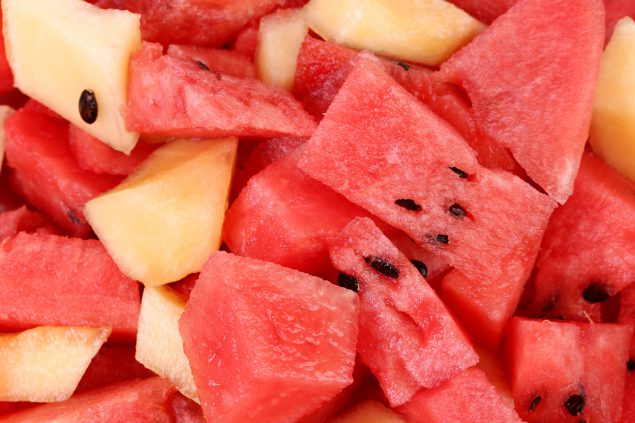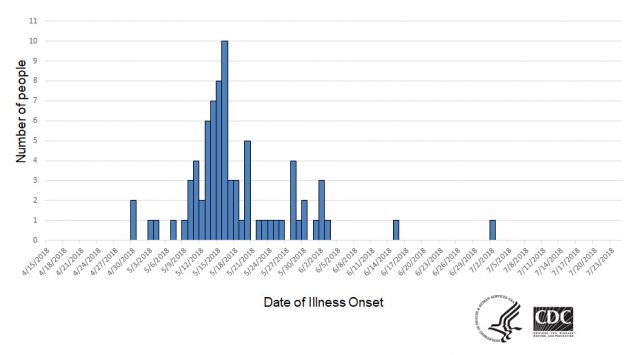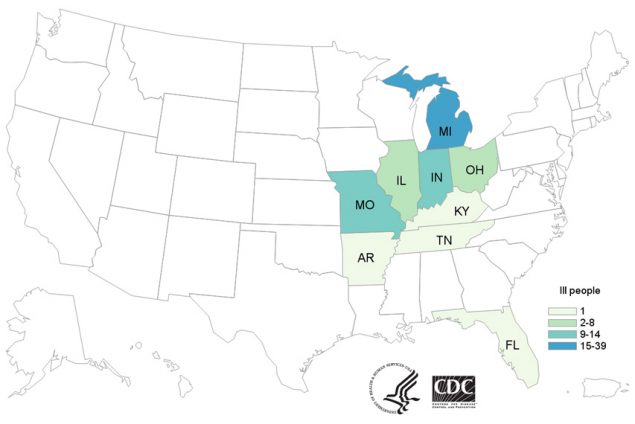2018 Salmonella Adelaide Infections Linked to Pre-Cut Melon (Final Update)
Posted July 26, 2018 11:30 AM ET
This outbreak appears to be over. CDC recommends that consumers, restaurants, and retailers choose and handle fruit safely to help prevent foodborne illness. Wash hands and food preparation surfaces before and after preparing fruit. Refrigerate precut fruit at 40°F or colder.
- As of July 26, 2018, this outbreak appears to be over.
- CDC, public health and regulatory officials in several states, and the U.S. Food and Drug Administration investigated an outbreak of Salmonella Adelaide infections.
- Seventy-seven people infected with the outbreak strain were reported from nine states.
- Thirty-six people were hospitalized. No deaths were reported.
-
Epidemiologic and traceback evidence indicated that pre-cut melon supplied by Caito Foods, LLC of Indianapolis, Indiana was the likely source of this multistate outbreak.
- Most of the ill people reported eating pre-cut cantaloupe, watermelon, or a fruit salad mix with melon purchased from grocery stores.
- Information collected from stores where ill people shopped indicates that Caito Foods, LLC supplied pre-cut melon to these stores.
- Consumers, restaurants, and retailers that had recalled pre-cut melon should take these steps to make sure harmful germs from recalled fruit don’t contaminate other foods:
- Consumers should wash and sanitize drawers and shelves in refrigerators and freezers where recalled pre-cut melon was stored.
- Retailers should wash and sanitize bins or containers where recalled pre-cut melon was stored.
- In the United States, nearly half of foodborne illnesses are caused by germs on fresh fruits and vegetables. CDC recommends that consumers, restaurants, and retailers always choose and handle fruits safely to help prevent foodborne illness.
Outbreak Summary
CDC, public health and regulatory officials in several states, and the U.S. Food and Drug Administration investigated a multistate outbreak of Salmonella Adelaide infections.
Public health investigators used the PulseNet system to identify illnesses that were part of this outbreak. PulseNet is the national subtyping network of public health and food regulatory agency laboratories coordinated by CDC. DNA fingerprinting is performed on Salmonella bacteria isolated from ill people by using techniques called pulsed-field gel electrophoresis (PFGE) and whole genome sequencing (WGS). CDC PulseNet manages a national database of these DNA fingerprints to identify possible outbreaks. WGS gives a more detailed DNA fingerprint than PFGE.
As of July 24, 2018, 77 people infected with the outbreak strain of Salmonella Adelaide were reported from nine states. A list of the states and the number of cases in each can be found on the Case Count Map page.
Illnesses started on dates ranging from April 30, 2018, to July 2, 2018. Ill people ranged in age from less than 1 year to 97, with a median age of 67. Among ill people, 67% were female. Out of 70 people with information available, 36 (51%) were hospitalized. No deaths were reported.
Whole genome sequencing analysis did not identify any predicted antibiotic resistance in isolates from 57 ill people. Testing of 3 clinical isolates using standard antibiotic susceptibility testing methods by CDC’s National Antimicrobial Resistance Monitoring System (NARMS) laboratory also did not show any antibiotic resistance.
Investigation Details
Epidemiologic and traceback evidence indicated that pre-cut melon supplied by the Caito Foods, LLC of Indianapolis, Indiana was the likely source of this multistate outbreak.
In interviews, ill people answered questions about the foods they ate and other exposures in the week before they became ill. Thirty-six (64%) of 56 people interviewed reported eating pre-cut melon purchased from grocery stores, including cantaloupe, watermelon, or a fruit salad mix with melon. Twelve other people reported eating melon, but did not specify whether it was pre-cut.
Information collected from stores where ill people shopped indicated that Caito Foods, LLC supplied pre-cut melon to these stores. On June 8, 2018, Caito Foods, LLC recalled fresh-cut watermelon, honeydew melon, cantaloupe, and fresh-cut fruit medley products containing one of these melons that were produced at the Caito Foods facility in Indianapolis, Indiana.
As of July 26, 2018, this outbreak appears to be over.


